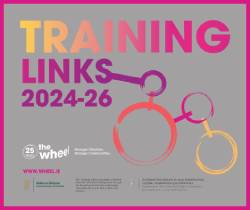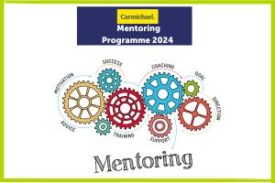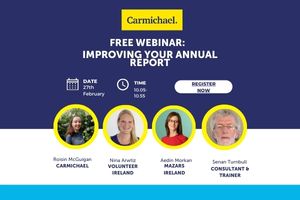Target Audience
Individuals or organisations interested/involved in setting up and running a small non-profit organisation, or supporting others doing the same.
Outline
This online course will be delivered over 2 weekly Zoom sessions as per the details below. For privacy reasons, these sessions will not be recorded, so please make sure to attend both sessions if possible.
Module 1: (Tues 1st July, 10am – 1pm)
Establishment of a Group
- Setting up a community group
- Deciding on the Legal Structure
- Writing Your Constitution
- Recruiting Volunteers
Running of the Group
- Committee Roles
- Running a Meeting
- Agendas/Minutes
Module 2: (Tues 8th July, 10am – 1pm)
Making Decisions
- Conflict of Interest
- Code of Conduct
- Communication with members of group
Legal Duties
- Regulatory Responsibilities
- Charity/Tax & Bank Accounts
- Succession Planning
Methodology
Delivered virtually via Zoom.
Target Audience
Managers and staff, responsible for data protection of charities and not-for-profits.
Outline
This training course is designed to engage management and staff of charities & non-profits, helping them understand the requirements of the GDPR and how to become compliant with a set of policies and procedures. These are presented in a practical and accessible manner, with templates provided to the attendees
1. The fundamentals of the GDPR
- The key principles of the GDPR
- Legal basis for processing
- Data Subject rights
2. Required policies, procedures, and records
- Data Protection Policy
- Data Protection Officer needed – Yes/No?
- Data Inventory
- Data Retention Policy
- Information Security Policy
- Records of Processing Activities (ROPA)
- Data Protection Notice for website (privacy statement)
- Procedures for handling individual’s rights
- Data breach handling procedure
- CCTV Policy (may be optional)
3. Other requirements (e.g. Data Protection Impact Assessments – DPIA)
Methodology
Delivered virtually, via Google Meet. A copy of the slides will be provided as well as a link to download the templates.
Target Audience
Anyone wishing to pick up some productivity tips in the use of MS Word, Excel, PowerPoint, Outlook and OneNote. Prior knowledge of Microsoft Office/Microsoft 365 is essential.
Outline
In this course you will learn productivity tips from the following Microsoft programs:
Outlook
- Cleaning up your inbox
- Scheduling emails in advance
- Creating simple rules
- Using quick parts
Word
- Working with styles
- Contents pages
- Cover pages
- Watermarks
Excel
- Cleaning data
- Separating text from within a cell
- Locking cells
- Displaying data visually
PowerPoint
- Using slides from another presentation
- Changing fonts throughout the entire presentation
- Working with images and shapes
- Using the presenter view
Methodology
Delivered via Microsoft Teams. This session will be recorded and the recording will be circulated to participants on completion.
Target Audience
Experienced Excel users wanting to learn more about PowerBI and how it can help working with multiple data sources.
Outline
This is a standard Microsoft curriculum which means that it has to be delivered according to the instructions laid out.
The course will take place on Zoom over 5 sessions as per details below. Homework will be assigned between sessions. Resources and links will be stored on a platform called GiraffePad. Please note these sessions will be recorded and recordings will be sent to attendees only. Full instructions and links will be given after registration.
Session One (90 minutes) Wed 07 May starting at 3.15pm
Accessing and preparing data:
- How to load data from Excel and CSV files
- Use Get and Transform/Power Query to cleanse and prepare the data
- Preparing the tables in Power Query
- Linking them together
Session Two (90 minutes) Wed 14 May starting at 3.15pm
Data Modeling and Exploration:
- Create a range of charts
- Highlight and cross filter
- Create new groups and hierarchies
- Create measures to the model to do additional analysis
Session Three (90 minutes) Wed 21 May starting at 3.15pm
Data visualisation:
- Building a complete report ready to be published to PowerBI service
- How to do conditional formatting
- Add a logo
- Import a custom visual
- Apply a custom theme
- Add bookmarks to tell a story
Session Four (90 minutes) Wed 28 May starting at 3.15pm
Publishing and Accessing reports:
- Create a mobile view of your report
- Publish this report to PowerBI service
- Create a dashboard in PowerBI service
Session Five (90 minutes) Wed 04 June starting at 3.15pm
Collaboration:
- Learn how to share your dashboard and collaborate with other users
Methodology
- Delivered virtually via Zoom and recorded.
- GiraffePad will be the platform used to hold the Zoom links/training materials.
Target Audience
Anyone needing to better understand the implications of the Companies Act 2014 & Charities Act 2009 for organisations in the not-for-profit sector.
Outline
This online workshop explores how the Companies Act 2014 impacts on Charities and Not-for Profit Companies that are Limited by Guarantee, the requirements of the Charities Act 2009, the role of members, the duties and responsibilities of Directors and Other Officers and the preparation of Financial Statements under Companies Act 2014.
Methodology
Delivered virtually via Zoom.
Target Audience
You should be comfortable with the Excel basics and/or be using Excel regularly including formulas/functions/sort and filtering/charts.
Outline
The course will take place on Zoom over 4 sessions as per details below. Homework will be assigned between sessions. Resources and links will be stored on a platform called GiraffePad. Please note these will sessions will be recorded and shared with the attendees only. Full instructions and links will be given after registration.
Session One (90 minutes) 19 Feb starting at 3.15pm
- Revision of basics: formulas/functions/fixing cells/lists
Session Two (90 minutes) 26 Feb starting at 3.15pm
- Vlookup function: What it is, what you use it for, use in same workbook and with different workbooks.
Session Three (90 minutes) 05 March starting at 3.15pm
- Introduction to Pivot Tables
Session Four (90 minutes) 12 March starting at 3.15pm
- If functions & Introduction to Conditional Formatting
- Final Q&A
Methodology
- Delivered virtually via Zoom.
- GiraffePad will be the platform used to hold the Zoom links/training materials.
- Homework will be assigned between sessions.
Target Audience
Board Members, Chairpersons and CEOs of non-profit organisations.
Outline
- Roles and responsibilities – Board, CEO, Chair
- Communication between CEO and Chair (Board)
- HR sub-committee (CEO Selection, Review, Remuneration, Succession Planning)
- CEO role in relation to the Board
- CEO performance appraisals – how to conduct appropriately
- Board only sessions
- Board evaluation (its value and purpose)
- Success factors for effective relationships
- Common problems/pitfalls with relationships and boundaries
- Culture / code of conduct / differences of opinion / behaviour
Methodology
Delivered virtually via Zoom.
Target Audience
Are you a Board member of a voluntary or community group? Are you unsure of what is expected of you? Do you want to ensure your organisation is governed in accordance with good practice?
Outline
This session will demystify Board members’ roles and responsibilities and give you tools to enhance your contribution and the effectiveness of your Board. It outlines the purpose of the board as a whole in relation to governance and management. We then examine the specific roles of individual board members and in particular, their legal responsibilities and duties under the Charities Act (2009) and the Companies Act (2014). The workshop will finish with a discussion on typical problems arising within boards and some practical solutions to deal with them.
Methodology
Delivered virtually via Zoom.
Target Audience
Middle and Senior Managers, Board Members.
Outline
A strategy is about how an organisation best positions itself whilst remaining relevant. A good strategy is clear and succinct. It boldly sets out your organisation’s ambitions, sets a clear focus aimed at achieving your mission, and it is embedded in reality.
This Strategic Planning workshop will guide you through core elements of strategy: challenge, cohesion and commitment. It will look at approaches and models in conducting strategic analysis, examining options, building in agility and how to monitor implementation.
Step-by-step, you will learn what a strategic planning process involves, what tools and techniques can help you along the way, what the end result should look like, and how to get everyone on board.
Methodology
Delivered virtually via Zoom.
Target Audience
Trustees, Chairs, CEOs, and those responsible for governance in their Charity.
Outline
The Charities Governance Code explains the minimum standards you should meet to effectively manage and control your charity. This workshop will walk you through the requirements of the code including actions and evidence needed to demonstrate compliance.
Methodology
Delivered virtually via Zoom.




